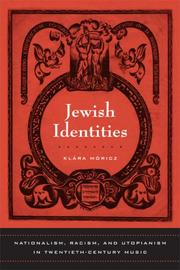| Listing 1 - 1 of 1 |
Sort by
|

ISBN: 0520933680 9780520933682 9780520250888 0520250885 Year: 2008 Publisher: Berkeley University of California Press
Abstract | Keywords | Export | Availability | Bookmark
 Loading...
Loading...Choose an application
- Reference Manager
- EndNote
- RefWorks (Direct export to RefWorks)
Jewish Identities mounts a formidable challenge to prevailing essentialist assumptions about "Jewish music," which maintain that ethnic groups, nations, or religious communities possess an essence that must manifest itself in art created by members of that group. Klára Móricz scrutinizes concepts of Jewish identity and reorders ideas about twentieth-century "Jewish music" in three case studies: first, Russian Jewish composers of the first two decades of the twentieth century; second, the Swiss American Ernest Bloch; and third, Arnold Schoenberg. Examining these composers in the context of emerging Jewish nationalism, widespread racial theories, and utopian tendencies in modernist art and twentieth-century politics, Móricz describes a trajectory from paradigmatic nationalist techniques, through assumptions about the unintended presence of racial essences, to an abstract notion of Judaism.
Jews --- Music --- Nationalism in music. --- Nationalism and music --- National music --- History and criticism. --- History and criticism --- Bloch, Ernest --- Schoenberg, Arnold, --- Shenberg, Arnolʹd, --- Schönberg, Arnold, --- Schenberg, A. --- Shenberg, A. --- שנברג, ארנולד --- Criticism and interpretation. --- Bloch, Ernest, --- Bloch, Ernst, --- Schönberg, Arnold --- 20th century politics. --- case studies. --- classical music. --- essentialist assumptions. --- ethnic groups. --- formidable challenge. --- jewish identities. --- jewish identity. --- jewish music. --- jewish nationalism. --- modernist art. --- paradigmatic nationalist. --- racial theories. --- religious communities. --- russian jewish composer. --- swiss american. --- utopian tendencies.
| Listing 1 - 1 of 1 |
Sort by
|

 Search
Search Feedback
Feedback About UniCat
About UniCat  Help
Help News
News